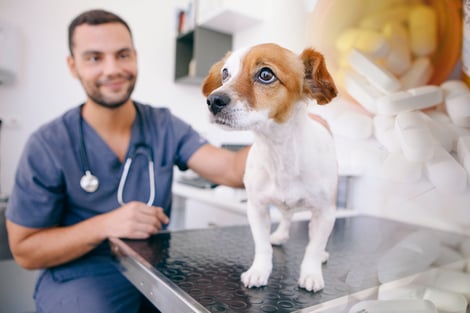Donating Pet Prescriptions: Why Can’t I Pass Them Along?

When a beloved pet dies, especially an elderly one or one with a long-term health condition, you may have leftover medications and/or prescription pet food.
A lot of people have questions about donating pet prescriptions.
While it seems wasteful, many veterinary clinics or animal shelters won’t accept leftover medications at all, and none are likely to accept opened or expired products.
There are many reasons why they won’t. For instance, if the medication was opened or stored improperly, it may no longer be effective, or it may degrade and be harmful. However, clinics and shelters may be willing to accept unopened bags or cans of prescription pet foods.
What are the rules and options for donating pet prescriptions?
Use Medicines as Prescribed
Medicines for people and animals can be dangerous if they are not used as prescribed for the creature and condition for which they were prescribed. Usually, medications are to be used up to treat a health condition, so leftover medication isn’t a problem.
However, if the medication doesn’t seem to be working within the amount of time your veterinarian says you should see improvement, then they may prescribe something else, and you’ll need to get rid of the unwanted medication.
The American Veterinary Medicine Association (AVMA) reports that over-the-counter and prescription medications are a leading cause of pet poisoning. Many medicines for people — including pain relievers like ibuprofen, antidepressants, and sleep aids — are dangerous for pets.
But even medicines that are prescribed for pets can make another pet sick. For example, vets sometimes prescribe tramadol for anxiety in pets. But a dose that’s too high can make another pet wobbly or agitated — and can even cause seizures. Also, it’s good to keep medications away from children.
When it comes to medications, AVMA provides these commonsense guidelines.
- Keep pets away from human medicines.
- Don’t leave pills sitting out on a counter or bedside where an animal can get them.
- Don’t leave pill bottles within reach. Dogs can and do chew through them.
- If you drop a pill, pick it up immediately.
- Contact your vet if your animal eats a medicine that wasn’t prescribed just for them.
- Never give any medication to your pet without consulting a veterinarian.
- Keep these numbers handy in case a pet gets into any medications by accident (they may charge a fee for their life-saving advice):
- ASPCA Animal Poison Control Center Phone Number: (888) 426-4435
- Pet Poison Hotline (855)764-7661
Rules for Safe Disposal of Medications
It’s more confusing than you may think.
There are several government agencies that are concerned about safely getting unused or expired medications out of people’s homes where they may do more harm than good. (There are also separate rules for places like pharmacies, hospitals, and veterinary clinics. We won’t be covering these rules.)
The U.S. Food & Drug Administration (FDA) has rules about disposing of unwanted medications in your home. Their main concern is to ensure that unused or expired medications are no longer in the home, especially controlled substances that may be prescribed for specific medical reasons.
For households, the FDA has a “flush list” of medications that are acceptable to flush down the toilet or drain for the safety and health of people (and pets) in the home. These include opioids and a few non-opioids.
In making their recommendations about the flush list, the FDA considered the risk to the environment. Their research led them to believe that the risks to human health and safety caused by leaving these medications in the home are greater than the risks of putting them in the environment. That’s because there is no evidence to suggest that the concentration of these substances in the water is harmful to the environment.
The Environmental Protection Agency (EPA) is concerned with keeping our drinking water safe from dangerous levels of hazardous substances like germs, disinfectants and their byproducts, certain types of chemicals, and some pharmaceuticals.
Overall, this is what they recommend:
-
First choice: Take unused or expired prescription or over-the-counter medications to a drug take-back location. There are many located in the U.S., such as pharmacies. The State of Ohio Board of Pharmacy also has a list of helpful resources.
-
Second choice for opioids and other controlled substances: Flush approved items down the toilet or sink. The FDA lists “controlled substances” that are on their approved “flush list.” DO NOT FLUSH OTHER TYPES OF MEDICATIONS. If you’re not sure, ask a pharmacist if a medication is on the flush list or not.
-
Second choice for other unused or expired medications: Safely dispose of in them in your trash by taking the following steps. Have a disposable container with a lid or sealable bag. In it, put dirt, coffee grounds, or cat litter (something that people or animals are unlikely to eat). Take the medication out of its original container and put the medication in the container or bag. Place this in your trash. Before you put your empty prescription containers in the trash, make sure that your personal information and prescription number are no longer visible (use a dark permanent marker or duct tape to cover the information on the label, or scratch off the label).
Talk to Your Veterinarian about Safety
Veterinarians care about keeping all animals safe by making sure that the right medicines get to the right animals. They also want to make sure that pets and children stay away from medicines they shouldn’t be getting. So if you have questions about what to do with leftover medicines, you can ask the helpful staff at your clinic.
When it comes to pharmaceutical waste, we can all play a part in keeping pets, people, and the water we drink safe for everyone.

